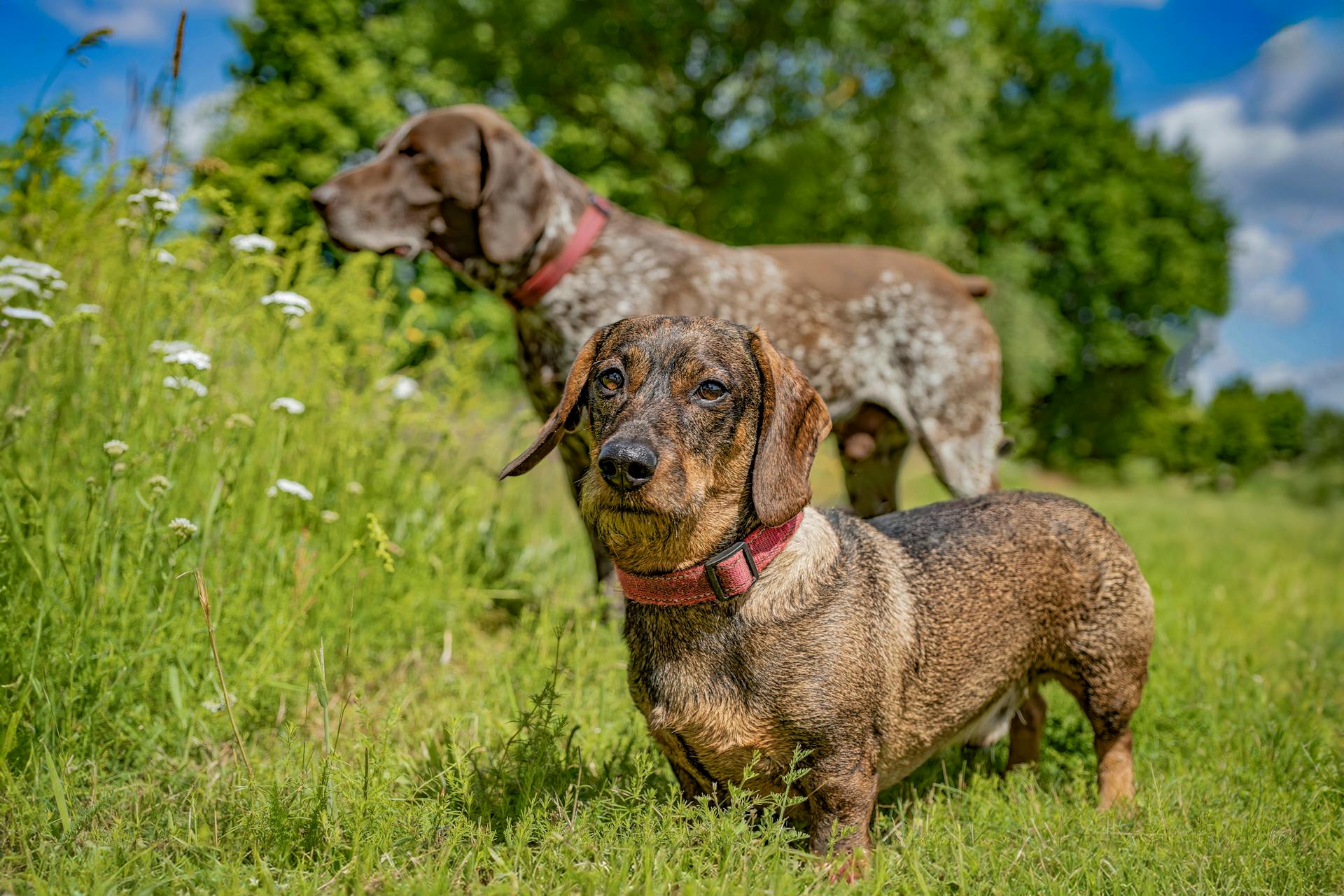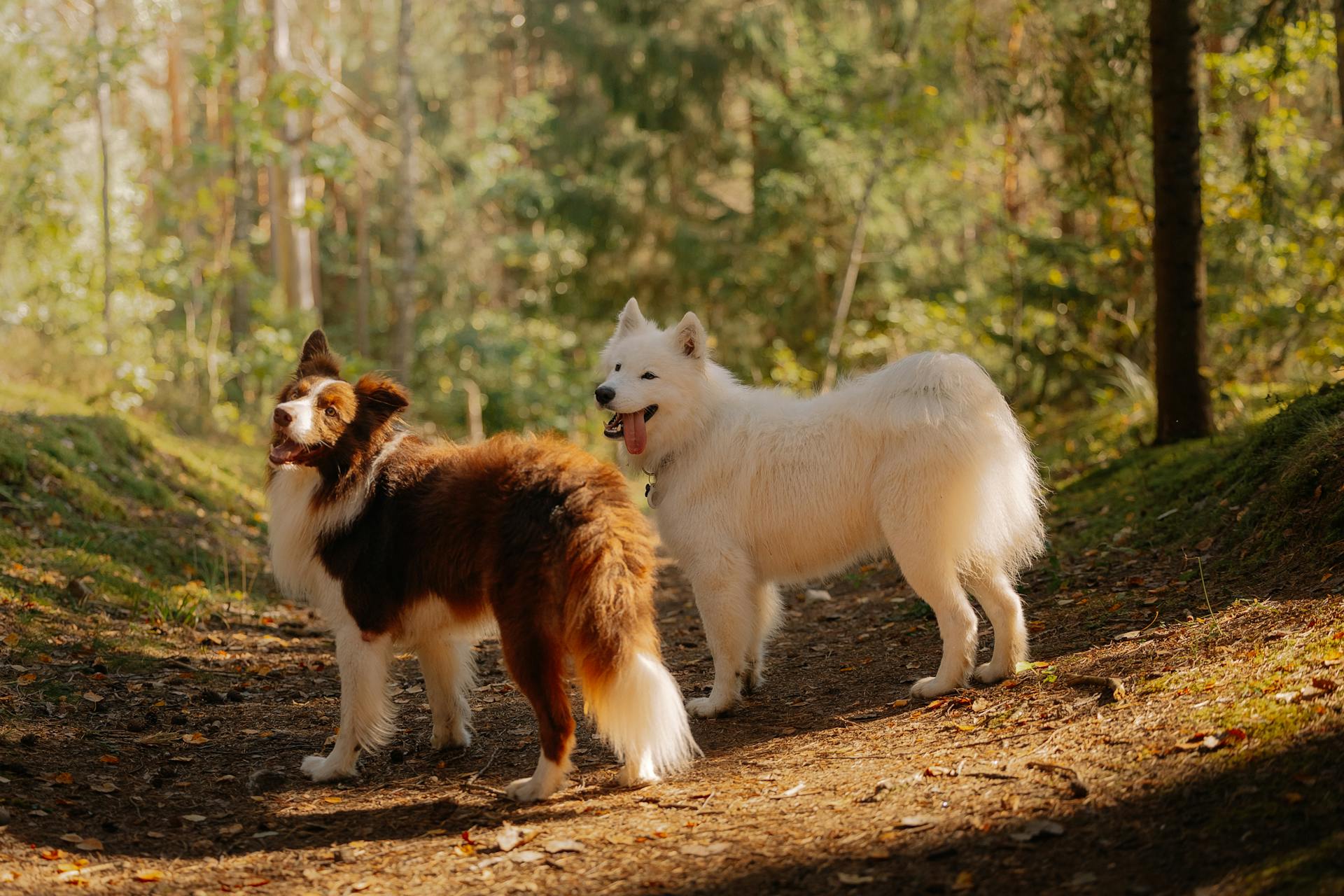
Dogs can catch pneumonia just like humans do, but it's not always easy to spot the symptoms.
Pneumonia is a serious infection that inflames the lungs and can cause a dog's breathing to become labored and shallow.
Dogs can contract pneumonia through bacterial, viral, or fungal infections, with bacteria being the most common cause.
Their weakened immune system can make them more susceptible to infections.
Dogs can catch pneumonia from other dogs, especially in kennels or shelters, where the risk of transmission is higher.
Some breeds, such as Bulldogs and Pugs, are more prone to pneumonia due to their brachycephalic skull structure, which can make breathing more difficult.
Their small airways can become easily congested, making them more susceptible to infections.
Intriguing read: What Food Gives Dogs Diarrhea
Causes of Canine Pneumonia
Canine pneumonia can be caused by several factors, including bacterial infections, viruses, fungi, or parasites.
Bacterial infections are the most common cause of pneumonia in dogs, with Bordetella bronchiseptica, E. coli, Klebsiella pneumoniae, Mycoplasma, Pasteurella multocida, Pseudomonas aeruginosa, and Streptococcus zooepidemicus being the most common bacteria responsible.
Some of these bacteria, like Bordetella bronchiseptica, are contagious, especially to dogs with compromised immune systems.
Dogs with weakened immune systems, chronic vomiting, and certain breeds' genetic predispositions are at a higher risk of developing pneumonia.
Aspiration pneumonia, which occurs when a dog inhales foreign material or vomit "down the wrong pipe" into the lungs, is another common cause of pneumonia in dogs.
This can happen due to difficulty swallowing or regurgitation, which can be caused by conditions like cleft palate or metabolic disorders.
Signs and Symptoms
Dogs with pneumonia often exhibit a range of symptoms, from mild to severe.
A deep, persistent cough is a common sign of pneumonia in dogs. It can be accompanied by a rapid breathing rate, difficulty breathing, and wheezing.
Fever is another common indicator of pneumonia, with a body temperature above 103°F considered a fever.
Dogs with pneumonia may also show intolerance to exercise, lacking interest in activities they usually enjoy and tiring quickly.
In addition to these symptoms, dogs with pneumonia may exhibit a range of respiratory problems, including shallow breathing, increased respiratory rate, and cheek puffing.
The following symptoms may be present in dogs with pneumonia:
- Coughing
- High fever
- Difficulty breathing
- Lethargy
- Difficulty exercising
- Runny nose
- Nasal whistling or wheezing
- Irregular breathing
- Dehydration
- Weight loss or anorexia
A bluish tint to the gums or tongue can be a sign of inadequate oxygen levels, warranting immediate veterinary attention.
In severe cases, dogs may pant incessantly, even at rest, indicating a struggle to breathe.
Diagnosis and Detection
To diagnose pneumonia in dogs, your veterinarian will typically start by reviewing your dog's medical history and conducting a nose-to-tail physical exam.
Your vet will take your dog's temperature to check for fever and listen closely to the lungs with a stethoscope to detect any abnormal sounds.
A chest X-ray is often recommended to reveal inflammation in the lungs and help differentiate pneumonia from other respiratory diseases.
Your vet may also run additional diagnostic tests like blood work, urinalysis, and X-rays of the chest and lungs to determine what's exactly wrong.
Suggestion: Vet Dogs Dog Treats
If your vet suspects pneumonia, they'll likely recommend a chest X-ray, which can make them suspicious of pneumonia and help confirm the diagnosis.
A thorough physical examination is the first step in diagnosing pneumonia, involving a vet listening to your dog's chest for abnormal lung sounds and checking for other signs of illness like fever, nasal discharge, or increased heart rate.
Treatment and Prevention
If your dog has pneumonia, treatment will depend on the cause, but antibiotics are often prescribed to fight off bacterial infections.
Veterinarians may also prescribe medications to control symptoms like fever and pain, as well as coughing and difficulty breathing.
Non-steroidal anti-inflammatory medication (NSAID) is commonly used to reduce fever and pain, but be sure to follow your veterinarian's dosage instructions carefully.
Bronchodilators and expectorants can help with coughing and difficulty breathing, and may be prescribed in addition to antibiotics.
In severe cases, hospitalization may be necessary for supportive care, including supplemental oxygen, intravenous antibiotics, or fluid therapy.
Giving your dog over-the-counter pain medications without consulting your veterinarian first can be harmful, so always check with your vet before administering any medication.
Antibiotic regimens typically last three to four weeks, and may continue for a while after the infection disappears.
A humidifier can be beneficial in keeping the air moist as your dog recovers, and plenty of bed rest is essential for a smooth recovery.
In some cases, vets may need to remove damaged lung tissue surgically, or attempt to remove foreign material from the lungs through suction or other means.
Contagion and Spread
You're likely to catch pneumonia from your dog, but it's extremely rare. However, bacterial and viral pneumonia can be transmitted easily between dogs, especially if they are very young, older, or have a compromised immune system.
It's essential to separate the healthy dogs from your sick pup to prevent the spread of the disease. If you have multiple dogs in the home, take immediate action to isolate the sick dog.
Thoroughly clean all bedding, bowls, and gear, such as leashes, collars, and harnesses, to help avoid spreading the disease.
You might enjoy: Dogs Getting Sick from Dog Food
Bacterial
Bacterial pneumonia is a common issue in dogs, caused by bacterial infections in the lungs. The bordetella bacteria, also known as kennel cough, is one of the top culprits.
This type of infection can be prevented with the bordetella vaccine, which is a crucial step in protecting your furry friend. If your dog hasn't received this vaccine, it's essential to get it done as soon as possible.
Infectious pneumonia, caused by a viral or bacterial infection, is the most prevalent type of pneumonia in dogs. This means that if your dog has a weakened immune system or is exposed to contaminated environments, they're more likely to contract bacterial pneumonia.
Aspiration pneumonia occurs when your dog breathes in foreign material, such as vomit or liquid medication. This can lead to a bacterial infection in the lungs, making it essential to keep an eye on your dog's behavior and health after administering medication or if they're experiencing vomiting.
The symptoms of bacterial pneumonia can vary, but they often include difficulty breathing and coughing. If you notice any of these symptoms in your dog, it's crucial to seek veterinary attention right away.
For more insights, see: Bordetella and Kennel Cough
Is Canine Contagious?
Canine pneumonia is a serious condition that can be transmitted between dogs, especially if they're young, older, or have a compromised immune system.
You'll need to separate your healthy dogs from the sick one to prevent the spread of the disease. This means keeping them in separate rooms or areas of the house.
Bacterial and viral pneumonia can be passed from dog-to-dog and dog-to-cat, so it's essential to take precautions if you have multiple pets in your home.
You should thoroughly clean all bedding, bowls, and gear, such as leashes, collars, and harnesses, to help avoid spreading the disease.
Washing your hands after handling your sick dog is crucial, and you may also want to consider wearing a protective garment over your clothing to prevent the spread of the disease.
It's possible, but extremely rare, for dogs to pass respiratory infections to people.
You might like: Purina One Dog Food Making Dogs Sick
My Dog's?
My Dog's Pneumonia: Can It Be Contagious?
Dogs can get pneumonia from viral or bacterial infections in the respiratory tract.
Pneumonia in dogs can be quite serious, leading to a lack of oxygen and other health complications if not treated promptly.
If your dog is diagnosed with pneumonia, it's essential to follow your vet's advice to prevent the spread of the infection.
Infectious pneumonia is the most prevalent type of pneumonia in dogs, caused by a viral or bacterial infection in the respiratory tract.
Aspiration pneumonia can occur when a dog breathes in foreign material, such as vomit or liquid medication.
Fungus can also cause pneumonia in dogs, typically through the inhalation of spores.
Here are some common causes of pneumonia in dogs:
- Viral or bacterial infections
- Aspiration pneumonia (breathing in foreign material)
- Fungal infections (inhalation of spores)
Frequently Asked Questions
How likely is a dog to survive pneumonia?
A dog's survival rate from pneumonia is generally good, with an overall survival rate of 81.6% if treated properly. However, the outcome depends on various factors, including the dog's overall health and the type of pneumonia.
Can dogs get pneumonia from being wet?
Yes, dogs can get pneumonia from prolonged exposure to cold and wet weather, which can lead to respiratory tract inflammation and increase their risk of bacterial invasion. This risk is higher for young, older, and immunocompromised dogs.
Sources
- https://www.aspcapetinsurance.com/resources/dog-pneumonia/
- https://veterinaryemergencygroup.com/blog/pneumonia-in-dogs/
- https://www.dailypaws.com/dogs-puppies/health-care/dog-conditions/pneumonia-in-dogs
- https://wagwalking.com/wellness/can-dogs-get-pneumonia
- https://dogtime.com/dog-health/53547-pneumonia-dogs-symptoms-causes-treatments
Featured Images: pexels.com


